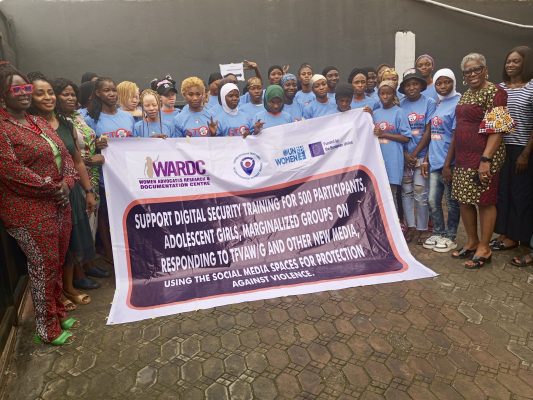Targeted at educating teenagers and adolescents on militating against online-based gender violence, the Women Advocates Research and Documentation Centre (WARDC), have trained girls in across Lagos communities, equipping them with necessary tools to embrace technology and impact other girls.
The one-day training held at WARDC’s head office in Lagos, on Technology Facilitated Violence Against Women and Girls is Funded by the European union with Support from the UN Trust Fund and UN Women.
According to the founding director, WARDC, Dr. Abiola Akiyode-Afolabi, “with data recently conducted between Nigeria and Kenya – who represent a huge population of people affected by online and technology facilitated violence, we have seen cases of women whose nude pictures are uploaded online, and we also realise that most women who get bullied online, don’t go back to the space.
“So, the platform is gradually restrictive for women, they are also gradually becoming vulnerable in these platforms and so we choose to create awareness around online violence and building a strong movement around it.”
Akiyode-Afolabi noted stressed, “we know that any movement that will be efficient will be one built around young people. Technology is the future and they are right in the middle of that future. It is important for women not to be left alone as we move into that future and so the project is to protect women from any form of violence against them, not only online, including radio, television as we have seen that women feel blackmailed with the kind of questions they are asked on TV or radio and some choose no longer to appear.
“We have seen in Kenya where women who went to contest for election had all manner of abuse technologically and so because tech is the future, we need women to be guarded and security conscious – know what to post and how to report. We want an online that is safe for women and men.”
The project seeks to adopt the train the trainer approach as these girls have been tasked to train at least 10 girls in their various communities. “We will have at least 10, 000 girls trained to have knowledge on technology facilitated violence in a year.
“We believe that this will take shape alongside what other coalition and feminists’ movements are also doing and so it will ensure that they get as many women as possible to feel safe using technology. We don’t want women to be afraid; Technology is a place to go.
“If there are issues affecting our girls, our education system must also be dynamic enough to see some of those threats especially because today, a lot of classes are taken online and there are violence that will occur in those spaces that people feel embarrassed about.
“We are looking at a future where some of these issues will be punishable as our cybercrime laws are still gender blind,” she added.



